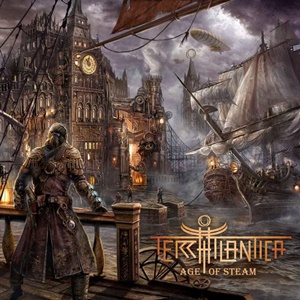If there’s one genre that offers that sense of escapism into another realm full of fantasy, majesty, and mystery, it’s power metal. The ability to transform yourselves as musicians and relay tales of historical, heroic battles against dragons, warriors, and setting a new course through stirring anthems and bombastic atmosphere put acts like Avantasia, Rhapsody, Edguy, and others into top tier acts. German band Terra Atlantica take influence from those in the genre (and more) for this second full-length Age of Steam. Building up a new society out of eleven thousand years at the bottom of the sea, the Greek water god Poseidon showed mercy as Atlantica rises back to the surface – with advanced technology at the helm.
“Rebirth 1815” as an intro sets up ‘our journey through the vortex’, the orchestral ambiance and narrative storyline the stuff of legends, something you would expect in grand cinema or theatrical openings – before the cascading riffs and double kick/keyboard symbiosis that is “Across the Sea of Time” kicks into full gear. The primary aspects of power metal are prevalent – multipart choirs for all the key chorus melodies to be driven to the heavens, equally engaging cultural guitars and harmonies, plus a rhythm section that throws down the right groove and fill flurries necessary to keep devil horns aligned high. Guest spots of the female and male variety vocally add dynamics to specific tracks as necessary, plus the extra orchestration from guitarist / singer Alex Hurzinger fleshes out the main compositions adequately, in a Rhapsody meets Orden Ogan way of enhancing the obvious hooks and harmonies that abound track to track. Those who love Teutonic thunder will love “The Treachery of Mortheon”, while others in need of a tender, dramatic ballad full of lush keyboard orchestration and acoustic to electric guitar parts will appreciate the rejoiceful nature to “Believe in the Dawn”.
Terra Atlantica have that equal balance of solid musicianship and metal philosophy against the large than life aspects for the lyrical content, supplementary choir-oriented voices at times, and the additional orchestration lines – delivered in a way where the pacing of the record has enough diversity that the listener won’t feel exhausted at similar tempos and arrangements. As such, Age of Steam has enough Gamma Ray/Helloween aspects against the nature of early Angra, Rhapsody, and Avantasia to probably gain wider appeal from most power metal followers, especially of the European variety.


